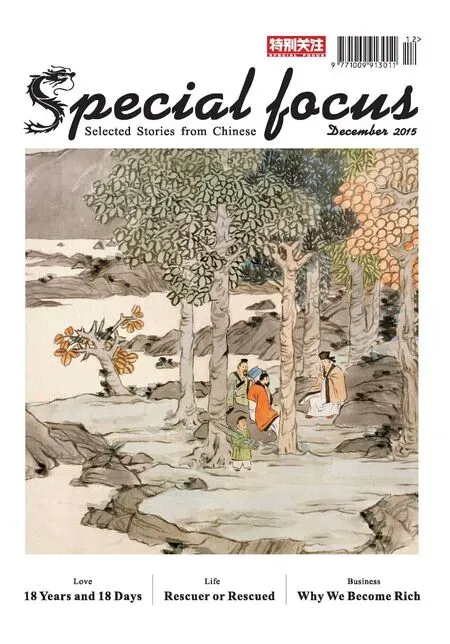Keeping a Patch of Pakchoi for Your Return
By Zhang Fenying
Keeping a Patch of Pakchoi for Your Return
By Zhang Fenying
M y son decided to fly back home from Australia and take a one-month vacation. One week before my son’s departure, I asked him whether he wanted to eat any particular food so that I could prepare in advance.He said that he just wanted to have some homegrown pakchoi.
On the farmland to the south of my house,I always grow pakchoi on the coming of autumns.Farmyard manure is used to fertilize the soil.Pesticides? Not an option for me.My disinsectization method is to keep growing one batch of greens after another until the number of pakchoi exceeds the appetite of the worms or wait till the pakchoi-eating worms enter hibernation in the cold.On winter mornings, each of the pakchoi is capped with white frost,too delicate even for the slightest touch,while at noon,against the gentle caressing of warm sunshine, the greens reappear brisk in high spirits.Pakchoi are shoveled out at dusk before frost gets to them and stir-fried with edible oil and salt only.Such a dish in taste surpasses any table delicacies of luxury and is our favorite at home.

Now,Australia is having its winter. For my son,he may come to miss pak-choi back home every day at the very sight of milk and bread,which are jade green and sweet from memories. But at the moment it is summer here in China,where can I find such winter pakchoi for him?Then he mentioned the scarcity of vegetables in Australian market.With the mere stroke of luck can you find some so-called“Chinese Green Vegetables”which bear a degree of resemblance but taste a world away.Pakchoi,for example,however cooked,tastes bitter.My son suspected that the differences lie in vegetable seeds.Although never been to Australia,I attribute the disappointment to the features of soil:plants adapt to the soil that nurture them.One case in point is the tangerine which tastes sweet and delicious when planted in the south of Huai River,yet it is another story if transplanted to the north of the River.Fruits can taste so far apart,let along vegetables grown in different continents.
It does not surprise me that my son would fly all the way home for a dish ofpakchoi.One’sstomachgrows homesick before he realizes so,an experience those home-tied would not understand.Upon graduation,I was assigned to work somewhere 50 kilometers away from home.There,local residents had rice soup(paofan),steamed stuffed buns(baozi)and fried bread sticks(youtiao)for breakfast in the morning,which I found ill-suited to my stomach.The rice soup tasted bland and insipid with excessive water.For me,a routine breakfast must contain Shenzi porridge(a kind of porridge made of ground grains),corn Shenzi porridge in winters and wheat Shenzi porridge in summers.The porridge bears milk-some thickness,yet tastes refreshing with a delicate scent.
My hometown is featured with high farmlands,yielding only a small number of rice.Therefore,sweet-smelling rice was a hard-to-catch.When I was admitted into a university,the family congratulated me on finally being able to have rice as daily food.Back then, admission into a university means state Hukou(a certificate of registered residence),and furthermore an allowance of 16 kilograms of rice on monthly basis.Yet I could not help missing Shenzi porridge from home when dining on rice for three meals.I once wrote a letter to my mum and in the letter informed her of this particular food desire.To my surprise,my mum went so far as to send me a sack of ground corns,though the postage itself turned out to be equivalent to a whole sack ofrice.Mum said she hated to waste money,but she hated to see me unhappy even more.Therefore,she did send it,no matter what.
At this time of the year,the sweet and tender winter pakchoi that my son covets can be found nowhere.I decided to use my motherly way to soothe hishomesickness--growinga patch of pakchoi. Idugoutthe potato from the vegetable garden and exposed the soiltothe scorching sun for a good two days so as to kill out worm eggs.The next day,from cesspool I lifted the fermented manure and spread it onto the dried-up soil and sowed seeds by the evening.
With heavenly blessings,this summer witnessed abundant rainfalls and the worms,battered by winds and drenched by rains,left the pakchoi alone.They grew lushly.Twenty days after my son’s return,the pakchoi werealreadygoodenoughfor soup-making.Icutthemoffand placed a large bowl of pakchoi soup with shredded meat before my son, saying“Pakchoi of this season does not taste good if stir fried,and soup is the best one can do with them.You can have it all to yourself,for we have had enough of it.”My son ate up pakchoiandlefttheshreddedmeat.“Mum,if only I could come back,just for such a bowl ofpakchoi soup.”
Overseas immigrantsare more often than notlabeledas successfuland glamorous,but, mysonconfessed,others havenoidea how they weather through the lonely days.Deep into the night,a mere thought of homegrown pakchoi coming from nowhere would give your heart a stab so hard that you almost wish you could book a ticket online for homeward flight immediately.
“Son,mum will always keep a patch of pakchoi for your return,no matter when.”I replied.
(FromYangtse Evening PostAugust 29th,2015.Translation:Dong Xiaolu. Illustration:Sveta)


